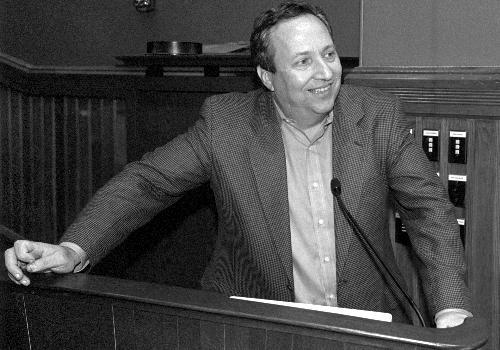
University President LAWRENCE H. SUMMERS, shown here speaking to a student group yesterday, has recently found himself at the center of a conflict over diversity and his political tendencies.
When Harvard’s presidential search committee chose Lawrence H. Summers—fresh from the ranks of partisan politics—as president last spring, they took a risk that they might be inviting politics into Mass. Hall.
Indeed, over the past eight months the new president has graced many a political column. But, in an odd twist for the Clinton appointee, Summers has found favor—and not disparagement—with columnists from the Right.
While Summers was making headlines for his calls for greater patriotism in academia and his spat with Fletcher University Professor Cornel West ’71, conservative editorial pages and columnists praised signs that he was the leader who could provide a needed lesson to out- of-touch, politically correct and knee-jerkingly liberal Harvard.
In October the conservative Wall Street Journal editorialized that a speech Summers gave criticizing universities’ ingrained skepticism of the military was commendable—a gutsy “profile in courage.”
Later, when Summers hinted at reconsideration of the University’s exclusionary policies towards the Reserve Officer Training Corp (ROTC), more conservatives joined the Summers bandwagon.
The Boston Herald praised Summers’ “instincts” on the issue, and held out hope that Summers was more open to revising the ROTC policies than Harvard’s liberal Faculty.
Finally, with the controversy between West and Summers, conservatives expressed their hopes even more vocally. Seeing a disregard for political correctness in Summers’ apparent willingness to take on the star black professor and a hint of ambivalence in his attitude towards affirmative action, the Right delighted that they had an ally in Mass. Hall.
The National Review wrote that Summers’ actions meant that “the intellectual Potemkin Village that three decades of political correctness has built might be exposed for the rickety stage prop it is.”
Many of these conservatives labeled Summers’ subsequent fence-mending efforts a cave-in to the very forces of political correctness that they hoped he was bucking. Still the fact that Summers could be a conservative darling for even a moment was surprising for a man who was once a leader in the Clinton administration and is now Harvard’s president.
Those reading such commentaries were invariably left wondering what had brought together such strange bedfellows. Was Larry Summers really a closet conservative?
Friends and colleagues say that this is impossible. They say that the Right may have come down with a case of wishful thinking—molding Summers’ actions to make for compelling copy and to argue their own case about what’s wrong with Harvard.
Still, friends’ descriptions of Summers may offer at least some hope for conservative observers.
A Leftward Lean
As President Clinton’s Treasury Secretary, Summers was more often a whipping post for the Right than its ally.
Summers was excoriated when as Deputy Secretary he slipped up and said that those favoring a repeal of the estate tax were selfish. A strong push for new regulation on corporate tax shelters went against the hopes of the business community. And as a chief architect of the administration’s 1995 bailout Mexico’s failing economy, Summers was often a lightening rod for criticism.
Read more in News
Conservative Activist Pulls for Permanent Tax Cuts












